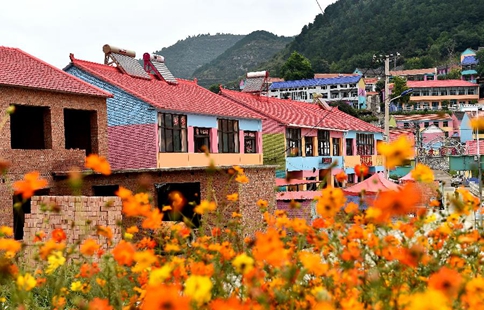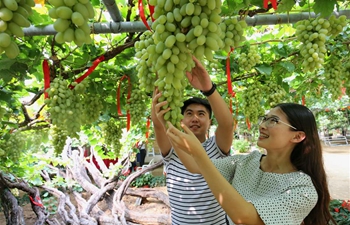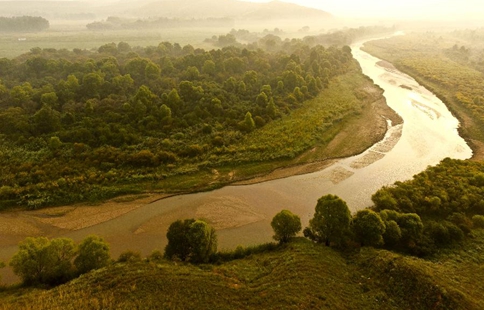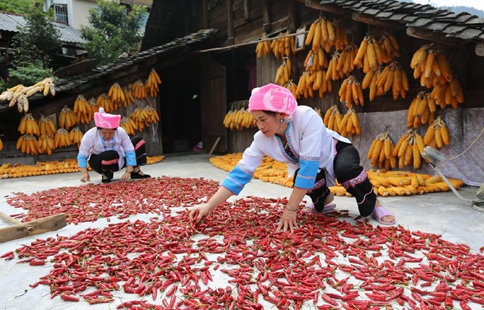ARUSHA, Tanzania, Sept. 6 (Xinhua) -- With his six-acre farm, Gallus Kayombo, an 85-year old farmer in Kyela district of Tanzania, used to get good cocoa yields annually, but with daunting challenges facing the crop, he gets a small number of beans leaving him languishing in poverty.
"We have been growing cocoa for decades and it means everything to us, but the declining production and price truly made our lives harder," said Kayombo.
Kayombo is among the hundreds of cocoa growers living in Kyela, a well-known district in southwestern Tanzania for growing organic cocoa.
At the moment, around 80 percent of the country's crop comes from Kyela district, and the majority of plants are grown there in organic conditions, by smallholders on plots well below a hectare, and sold directly from farms for exports.
Of late, however, cocoa production has not been doing so well for industry players -- from farmers to all those in the cocoa value chain, thus adversely affecting fortunes of the once vibrant and lucrative sector in the southwestern part of the east African nation.
Farmers in the district earn meager income and have lost hope in the cultivation of the crop, which if well managed can be one of the country's major foreign exchange earners. Its challenges range from poor agronomic practices to marketing.
In the 1970s and 80s, cocoa in the district was referred to as 'brown gold' by farmers and all those who were in the value chain, according to the farmers. But in recent years things have turned worse.
Florence Mwakyeja, 64, is one of the cocoa growers in the district, who has been growing the crop for more than three decades now.
He cites poor agronomic practices as a challenge that contributes to the decline of cocoa beans production in the district.
The father of six who owns a four-acre farm of cocoa views the challenge as detrimental to farmers in the district as many people still use traditional ways of farming, confining them to perpetual poverty.
He suggests the need for hefty investment in the sector, including the establishment of a cocoa processing plant.
"This will create employment as well as boost the price of cocoa and in the process transform farmers' lives," he says.
Apart from the decline in production, price fluctuation has also been cited as a serious challenge that cripples cocoa production.
Kayombo says that last year the price had reached 2.23 U.S. dollars per kg, but later dropped to 1.34 dollars and now it is 1.16 dollars per kg.
"The government should make policies to influence the price of the crop, as the current system does not benefit farmers," says Joram Mponjoli from Kyangala village, about 32 km from Kyela town.
Mponjoli suggests the need for farmers be trained on best agronomic practices from farm rehabilitation, harvesting, and post-harvest handling as well as helping them access organic foliar fertilizers and other farming inputs.
"Most cocoa trees here are aging; they are left with a few years to exhaust their economic usefulness. We need to be empowered on cost-effective farming skills, that will increase production, and the cocoa beans remain organic as well as planting new seedlings to replace the aged trees," he said.
The number of cocoa growers in Kyela was estimated to an average of 80,400 and by last year the production of cocoa beans was at 7,500 tonnes and the amount collected was 12 million dollars at the price of a 1.56 dollars per kg.
This year, according to Paul Sheyo, Kyela District's Agriculture, Irrigation, and Cooperative Officer, the district projects to harvest 8,250 tonnes.
"That's why we are determined to put in place serious measures to empower farmers with all skills needed to produce quality cocoa beans that can easily compete in the global market," the official said, adding: "Our aim is to ensure farmers produce organic cocoa as they have been doing for decades."
He said efforts are being made to address challenges such as declining soil fertility, aging cocoa farmers and over-aged cocoa trees.
"We're thinking of reinforcing the Kyela Cooperative Union (KYECU), which will be serving interests of cocoa growers in the district," he said.
Currently, 5,500 hectares of land is under cocoa farming, which was introduced in the district 65 years ago. The multi-million-dollar cash crop is being sold in Europe and the United States to satisfy the thirsty chocolate-making industries.

















